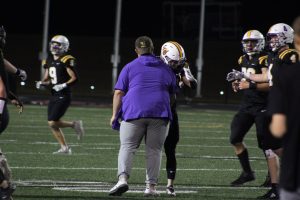Educator Evacuation
February 11, 2022
When it comes to looking for a job, people often gravitate towards fields they are passionate about and hold interest in. Specifically, teachers are individuals who are extremely passionate about their field of work and working with the youth. Over the past couple of years, teachers are losing that passion at a rapid rate, and it is happening in our own community. As of January 24, 2022, 18 teachers are resigning from Johnston schools after the 2021-2022 school year.
Since the beginning of the COVID-19 pandemic, teacher burnout has been a rising issue. According to a MissionSquare Research Institute survey done in September 2021, K-12 public school teachers reported feeling 52% more stressed, fatigued, and burnt-out about work during COVID-19 than other government employees. JMS Science teacher, Neal Patel, gives his take on experiencing teacher burnout, “Teaching is a job that takes from you. In the climate that we’re working in right now, it’s really taking from us… The feeling of being burnt-out is building.”
The atmosphere in schools has shifted, and the COVID-19 pandemic has only added difficulties to the lives of students and teachers. “I know COVID-19 has complicated a lot of things for teaching. It’s really changed coming back this year compared to any other year I’ve ever been in a classroom,” said Millie Kehrli, JMS Language Arts and Journalism teacher.
The COVID-19 pandemic has changed the experience of both students and teachers in schools. “Kids need more now after having experienced what they experienced. I think it is what made the job feel like it went from a hard and rewarding job to a job where you’re not sure if it’s even possible to get done all the things that you need to get done,” said Andrea Ward, JMS Language Arts teacher.
For many teachers, it seems that balancing teaching and their personal lives may just be too much to handle efficiently. “It’s [teaching] something that, if you love doing it, you wanna bring everything to the job. But that isn’t always something that feels sustainable when you also wanna bring your best to your family,” said Ward.
As burnout and life changes cause a fade in passion, many teachers are taking time to do some self-reflection on their feelings towards their careers. “I’m finding that some days it’s really hard to come into work, and that’s not really how teachers should feel. I can’t be the best teacher that I can be if I have those feelings,” said Patel.
Remote learning allowed teachers to have even more time to reflect on what their next move in life may be. “I had time to reflect on what’s really important to me and thinking about, at my age, the thing that’s really the most valuable to me and the most valuable thing to invest in is my time,” said Kehrli.
While teacher burnout is a big reason for resignation, there are many other factors that are impacting teachers’ decisions to leave the School District and the teaching profession. “One of the things that’s making teaching difficult right now is the political climate… People outside of education are talking about teachers and what they think goes on inside of schools without truly stopping to find out what is really going on inside of schools,” said Ward.
Teachers in the community have outwardly spoken out about how districts’ actions have influenced their decision to leave. “I really don’t feel like the district has stood up for teachers the way that they should’ve, the way that any organization should defend its employees when the employees aren’t doing anything wrong. Why am I gonna work for a place that doesn’t wanna defend me and the quality of work that I produce?” said Patel.
Recent events in the community surrounding the discussion of schools are yet another reason why teachers are deciding to leave the district. “I know that I’m not gonna change the minds of people in the community who believe very differently from what I do about the importance and value of public schools… If we could see some hope in that political conversation that’s happening, I might reconsider,” said Ward.
Many teachers have spoken up about rising tensions between the school district and its teachers, which may also be another reason for teacher resignation. “The district needs to stand by its teachers and it’s just not happening. The teachers are the professionals that the district has hired to do the work of teaching their kids. It’s a big slap in the face to me when we just can’t trust that our teachers are going to teach,” said Patel.
This tension has also caused some teachers to feel like there is a lack of public support for them. “I think there are some situations that I’ve seen that make me feel like this community really wants to support their schools and their teachers, but I think there have been some missed opportunities,” said Ward
“It sounds like the narrative of Johnston saying all the right things and doing nothing is Johnston, like it fits to a tee…” said Patel. Echoing another issue that has resulted in many resignations. “There’s quite a bit of a toxic culture here that I’m not a fan of.”
In November, the Johnston district offered to give out 13 early resignation bonuses at the end of the school year. Teachers who announced their resignations early could be awarded a $1,500 bonus. Kehrli, who is set to receive the bonus, gave her thoughts about the bonus, “I understand it works well for both parties. I get the incentive and they know early so they can start looking to fill the position early when there are more candidates.”
Many teachers are discussing the worth of the early resignation bonus. “It didn’t really play a role in my decision because it’s like a good chunk of money but I’m not going to weigh my livelihood on $1,500,” said Patel.
As teachers leave Johnston schools, they are forced to reconsider what they would like to do career-wise, and whether or not they will decide to remain in the education field. Kehrli discusses her plans for after she resigns from Johnston schools, “I wanna write a book… I’ve got something started and I want some time to focus on that… Then, if the right position came open… I’d consider that.”
The lack of passion that some teachers now hold for their jobs is causing them to look at career paths outside of education. “As I think about what I’m gonna do next, I’m not applying for teaching jobs for next year. It’s not to say that I’ll never do it again. It’s just a feeling that I have to pause,” said Ward. Patel also spoke about his plans to move out of the education field, “I will be leaving education and moving to a different field. I don’t know if I’m gonna go into details about that.”
While there may be a lack of passion for teachers, there certainly is not a lack of interest in education as they move onto new things in their lives. “Just because I’m not in the classroom doesn’t mean I don’t care about this anymore. I still believe so strongly in the importance and the value of public schools. I just have to figure out where is the best way for me to work toward that as an objective,” said Ward.
With all the ways that the world has changed in the past few years, teachers have been put head-to-head with new problems, but still are stuck with old solutions. “Now that we’ve had this pandemic and we’re facing these challenges that we’ve never faced before, we cannot continue to do things the same way that we have always done them,” said Ward.
These changes have occurred at a faster pace than anyone expected, but the world was not able to change fast enough to keep up. This slow pace of change is what is driving teachers out of schools, and out of the Johnston district. “What’s happening is teachers are already stretched out thin, and now they’re being stretched out even thinner… I do love to teach but it’s hard to work in that environment,” said Patel.





